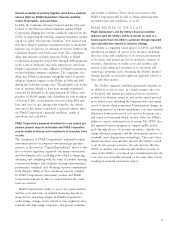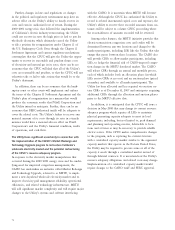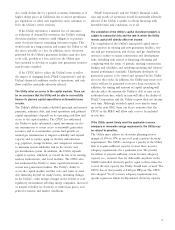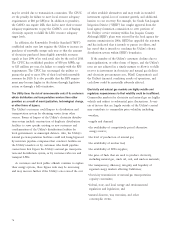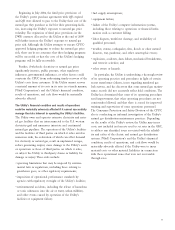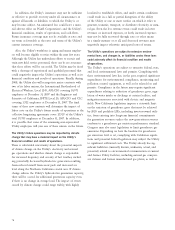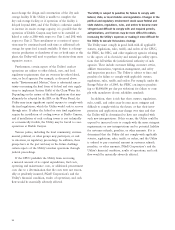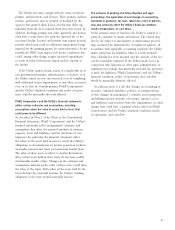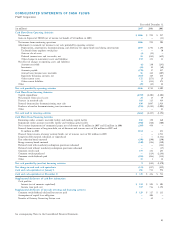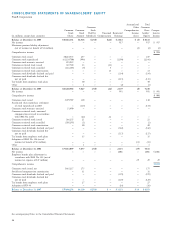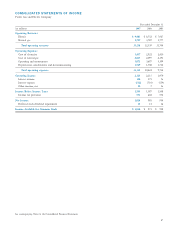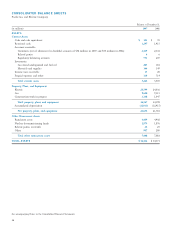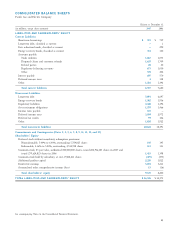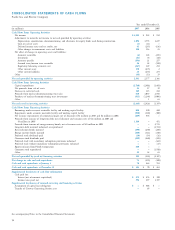PG&E 2007 Annual Report Download - page 82
Download and view the complete annual report
Please find page 82 of the 2007 PG&E annual report below. You can navigate through the pages in the report by either clicking on the pages listed below, or by using the keyword search tool below to find specific information within the annual report.80
must change the design and construction of the dry cask
storage facility. If the Utility is unable to complete the
dry cask storage facility, or if operation of the facility is
delayed beyond 2010, and if the Utility is otherwise unable
to increase its on-site storage capacity, it is possible that the
operation of Diablo Canyon may have to be curtailed or
halted as early as 2010 with respect to Unit 1 and 2011 with
respect to Unit 2. That curtailment or cessation of opera-
tions may be continued until such time as additional safe
storage for spent fuel is made available. If there is a disrup-
tion in production or shutdown of one or both units at this
plant, the Utility will need to purchase electricity from more
expensive sources.
Furthermore, certain aspects of the Utility’s nuclear
operations are subject to other federal, state, and local
regulatory requirements that are overseen by other federal,
state, or local agencies. For example, as discussed above
under “Environmental Matters,” there is substantial uncer-
tainty concerning the fi nal form of federal and state regula-
tions to implement Section 316(b) of the Clean Water Act.
Depending on the nature of the fi nal regulations that may
ultimately be adopted by the EPA or the Water Board, the
Utility may incur signifi cant capital expense to comply with
the fi nal regulations, which the Utility would seek to recover
through rates. If either the federal or state fi nal regulations
require the installation of cooling towers at Diablo Canyon,
and if installation of such cooling towers is not technically
or economically feasible, the Utility may be forced to cease
operations at Diablo Canyon.
Various parties, including the local community, environ-
mental, political, or other groups may participate, or seek
to intervene, in regulatory proceedings. In addition, these
groups have in the past and may in the future challenge
certain aspects of the Utility’s nuclear operations through
judicial proceedings.
If the CPUC prohibits the Utility from recovering
a material amount of its capital expenditures, fuel costs,
operating and maintenance costs, or additional procurement
costs due to a determination that the costs were not reason-
ably or prudently incurred, PG&E Corporation’s and the
Utility’s fi nancial condition, results of operations, and cash
fl ow would be materially adversely affected.
The Utility is subject to penalties for failure to comply with
federal, state, or local statutes and regulations. Changes in the
political and regulatory environment could cause federal and
state statutes, regulations, rules, and orders to become more
stringent and diffi cult to comply with and required permits,
authorizations, and licenses may be more diffi cult to obtain,
increasing the Utility’s expenses or making it more diffi cult for
the Utility to execute its business strategy.
The Utility must comply in good faith with all applicable
statutes, regulations, rules, tariffs, and orders of the CPUC,
the FERC, the NRC, and other regulatory agencies relating
to the aspects of its electricity and natural gas utility opera-
tions that fall within the jurisdictional authority of such
agencies. These include customer billing, customer service,
affi liate transactions, vegetation management, and safety
and inspection practices. The Utility is subject to fi nes and
penalties for failure to comply with applicable statutes,
regulations, rules, tariffs, and orders. For example, under the
Energy Policy Act of 2005, the FERC can impose penalties
(up to $1,000,000 per day per violation) for failure to com-
ply with mandatory electric reliability standards.
In addition, there is risk that these statutes, regulations,
rules, tariffs, and orders may become more stringent and
diffi cult to comply with in the future, or that their inter-
pretation and application may change over time and that
the Utility will be determined to have not complied with
such new interpretations. If this occurs, the Utility could be
exposed to increased costs to comply with the more stringent
requirements or new interpretations and to potential liability
for customer refunds, penalties, or other amounts. If it is
determined that the Utility did not comply with applicable
statutes, regulations, rules, tariffs, or orders, and the Utility
is ordered to pay a material amount in customer refunds,
penalties, or other amounts, PG&E Corporation’s and the
Utility’s fi nancial condition, results of operations, and cash
fl ow would be materially adversely affected.



